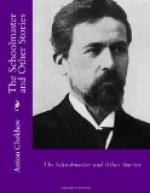A PLAY
“PAVEL VASSILYEVITCH, there’s a lady here, asking for you,” Luka announced. “She’s been waiting a good hour. . . .”
Pavel Vassilyevitch had only just finished lunch. Hearing of the lady, he frowned and said:
“Oh, damn her! Tell her I’m busy.”
“She has been here five times already, Pavel Vassilyevitch. She says she really must see you. . . . She’s almost crying.”
“H’m . . . very well, then, ask her into the study.”
Without haste Pavel Vassilyevitch put on his coat, took a pen in one hand, and a book in the other, and trying to look as though he were very busy he went into the study. There the visitor was awaiting him—a large stout lady with a red, beefy face, in spectacles. She looked very respectable, and her dress was more than fashionable (she had on a crinolette of four storeys and a high hat with a reddish bird in it). On seeing him she turned up her eyes and folded her hands in supplication.
“You don’t remember me, of course,” she began in a high masculine tenor, visibly agitated. “I . . . I have had the pleasure of meeting you at the Hrutskys. . . . I am Mme. Murashkin. . . .”
“A. . . a . . . a . . . h’m . . . Sit down! What can I do for you?”
“You . . . you see . . . I . . . I . . .” the lady went on, sitting down and becoming still more agitated. “You don’t remember me. . . . I’m Mme. Murashkin. . . . You see I’m a great admirer of your talent and always read your articles with great enjoyment. . . . Don’t imagine I’m flattering you—God forbid!—I’m only giving honour where honour is due. . . . I am always reading you . . . always! To some extent I am myself not a stranger to literature— that is, of course . . . I will not venture to call myself an authoress, but . . . still I have added my little quota . . . I have published at different times three stories for children. . . . You have not read them, of course. . . . I have translated a good deal and . . . and my late brother used to write for The Cause.”
“To be sure . . . er—er—er——What can I do for you?”
“You see . . . (the lady cast down her eyes and turned redder) I know your talents . . . your views, Pavel Vassilyevitch, and I have been longing to learn your opinion, or more exactly . . . to ask your advice. I must tell you I have perpetrated a play, my first-born —pardon pour l’expression!—and before sending it to the Censor I should like above all things to have your opinion on it.”
Nervously, with the flutter of a captured bird, the lady fumbled in her skirt and drew out a fat manuscript.
Pavel Vassilyevitch liked no articles but his own. When threatened with the necessity of reading other people’s, or listening to them, he felt as though he were facing the cannon’s mouth. Seeing the manuscript he took fright and hastened to say:




